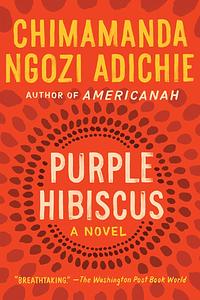Take a photo of a barcode or cover
emotional
reflective
slow-paced
Plot or Character Driven:
A mix
Strong character development:
Yes
Loveable characters:
Yes
Diverse cast of characters:
Yes
Flaws of characters a main focus:
Complicated
Moderate: Child abuse, Domestic abuse, Physical abuse, Toxic relationship
Minor: Miscarriage, Religious bigotry, Death of parent
i'm rather fried over all the inauguration bullshit and the fact our country is continually becoming more fascist so i can barely formulate my thoughts coherently. howEVER, i can say that i loved reading this and i have some fragmented thoughts i'll list:
- it was a really good portrayal of the abuse that happens in some religious households.
- i liked how kambali was almost passive in a way and how she grows to express herself more.
- i aspire to be like aunty ifeoma.
- the moral greyness in this was wonderful. i absolutely felt the divide in kambali's mind between what she wanted her dad to be all the time and the monster he was at times. but also, how he was such a positive pillar in a community. so often i feel like people on the internet like to categorize people in to strictly good or bad categories and completely ignore the greyness of reality. eugene as person was terrible to his family. he was by no means a good person. however, he did genuinely good things. both of those things can and should coexist.
- the things kambali's father said in the name of religion sickened me. genuinely.
- i need to try nigerian food so bad. if only i didn't live in a sparsely populated, rural, mostly white area...
- it was a really good portrayal of the abuse that happens in some religious households.
- i liked how kambali was almost passive in a way and how she grows to express herself more.
- i aspire to be like aunty ifeoma.
- the moral greyness in this was wonderful. i absolutely felt the divide in kambali's mind between what she wanted her dad to be all the time and the monster he was at times. but also, how he was such a positive pillar in a community. so often i feel like people on the internet like to categorize people in to strictly good or bad categories and completely ignore the greyness of reality. eugene as person was terrible to his family. he was by no means a good person. however, he did genuinely good things. both of those things can and should coexist.
- the things kambali's father said in the name of religion sickened me. genuinely.
- i need to try nigerian food so bad. if only i didn't live in a sparsely populated, rural, mostly white area...
challenging
hopeful
sad
medium-paced
Plot or Character Driven:
Plot
Strong character development:
Complicated
Loveable characters:
Yes
Diverse cast of characters:
No
Flaws of characters a main focus:
No
emotional
reflective
sad
medium-paced
Plot or Character Driven:
Character
Strong character development:
Yes
Loveable characters:
Complicated
Diverse cast of characters:
Yes
Flaws of characters a main focus:
Complicated
challenging
emotional
reflective
medium-paced
Plot or Character Driven:
Character
Strong character development:
Yes
Loveable characters:
Yes
Diverse cast of characters:
Yes
Flaws of characters a main focus:
Complicated
I struggled with how expository the first third felt, but once Purple Hibiscus picks up speed (around when Kambili first leaves to visit Ifeoma and her cousins), Adichie does not slow down.
Kambili is written beautifully!! She feels so human, her cocoon-like reaction to cruelty is so real, so urgent, and so easy to root for. All of the supporting cast in her aunt, cousins, brother, mother, and Father Adami are all funny and relatable, barring a questionable age gap between Adami and our main character.
Whenever an author tries to portray an event as serious as the violence from Papa, the writing needs to carefully ride the line between being too subtle and euphemistic to capture the horror, and too gratuitous to feel appropriate. Adichie succeeds with flying colors here.
An engine that takes a bit of time warming up, but is consistently good once it’s going.
7/10
Kambili is written beautifully!! She feels so human, her cocoon-like reaction to cruelty is so real, so urgent, and so easy to root for. All of the supporting cast in her aunt, cousins, brother, mother, and Father Adami are all funny and relatable, barring a questionable age gap between Adami and our main character.
Whenever an author tries to portray an event as serious as the violence from Papa, the writing needs to carefully ride the line between being too subtle and euphemistic to capture the horror, and too gratuitous to feel appropriate. Adichie succeeds with flying colors here.
An engine that takes a bit of time warming up, but is consistently good once it’s going.
7/10
I had some high hopes and expectations for this book, but it kind of fell flat for me. Don't get me wrong-it told a good story with rich plot lines, but I didn't feel the deep emotions that Adichie could have conveyed. The first problem I think was the two main plot lines that tried to interweave but didn't really match up. Nigeria is in a state of political conflict, and Kambili's father is the owner of a controversial newspaper, putting him in danger. However, her father is also an abusive man who stifles any life out of Kambili, her brother, and her mother. Adichie does delve into the historical part of the story, mostly about syncretism between Igbo culture and Christianity, but the story focuses more on Kambili's slow progress into freedom. Like I said, the political turmoil becomes more of a background idea tossed into the story just because the time period was right.
Another problem was that since Kambili's voice was stifled, the writing became stifled as well. Even though it was told in first person, there were so many times that I wanted to FEEL Kambili's anguish or really somehow empathize with her fear. Instead, it became a repetition of events for the first 100 or so pages. Whenever she does something, she's either frightened her father will yell or hoping that maybe this once, he will be proud of her. Then, when someone asks her why she does something odd, she inwardly wants to explain to them everything, but holds it all in. I understand it's scene-setting, but it becomes slightly dull when it's essentially the same events repeated in different scenarios.
Unfortunately, the climax of the plot comes too late. When it does, the book becomes somewhat exciting. I enjoyed seeing Jaja and Kambili grow, I just wish that since the father's abuse was the focus of the book, the blooming of their personalities would be more central. Even when major events occur, I felt like it was just listed or mentioned, that it wasn't given the emphasis it needed. The last section almost three years later should be one to tie up loose ends, but it seems like the few pages before it held a completely open package that needed a lot more than a few knots to finish up. There was so much potential after the mother's "desperate act," but by then Adichie already ended the story. Sadly, THAT would have been the book I wanted to read.
Another problem was that since Kambili's voice was stifled, the writing became stifled as well. Even though it was told in first person, there were so many times that I wanted to FEEL Kambili's anguish or really somehow empathize with her fear. Instead, it became a repetition of events for the first 100 or so pages. Whenever she does something, she's either frightened her father will yell or hoping that maybe this once, he will be proud of her. Then, when someone asks her why she does something odd, she inwardly wants to explain to them everything, but holds it all in. I understand it's scene-setting, but it becomes slightly dull when it's essentially the same events repeated in different scenarios.
Unfortunately, the climax of the plot comes too late. When it does, the book becomes somewhat exciting. I enjoyed seeing Jaja and Kambili grow, I just wish that since the father's abuse was the focus of the book, the blooming of their personalities would be more central. Even when major events occur, I felt like it was just listed or mentioned, that it wasn't given the emphasis it needed. The last section almost three years later should be one to tie up loose ends, but it seems like the few pages before it held a completely open package that needed a lot more than a few knots to finish up. There was so much potential after the mother's "desperate act," but by then Adichie already ended the story. Sadly, THAT would have been the book I wanted to read.
challenging
dark
sad
medium-paced
Plot or Character Driven:
A mix
Strong character development:
Complicated
Diverse cast of characters:
Yes
Flaws of characters a main focus:
Complicated
Graphic: Child abuse, Domestic abuse
Moderate: Violence
Minor: Murder, War








